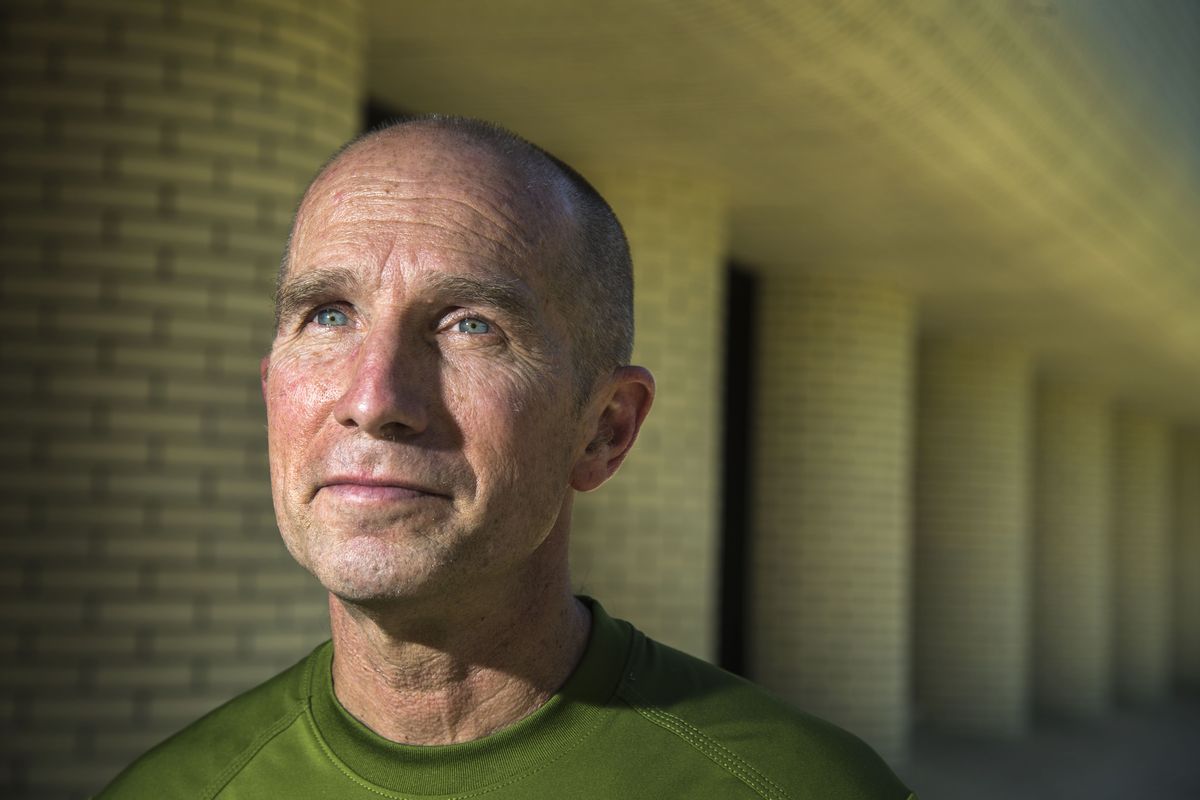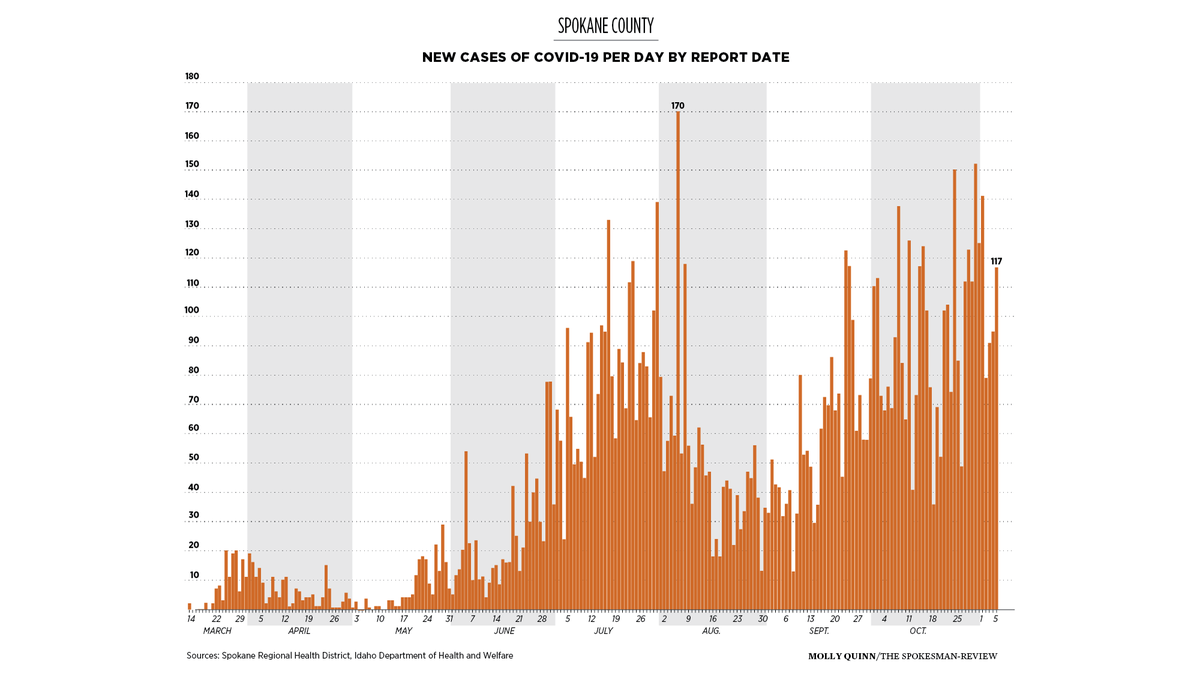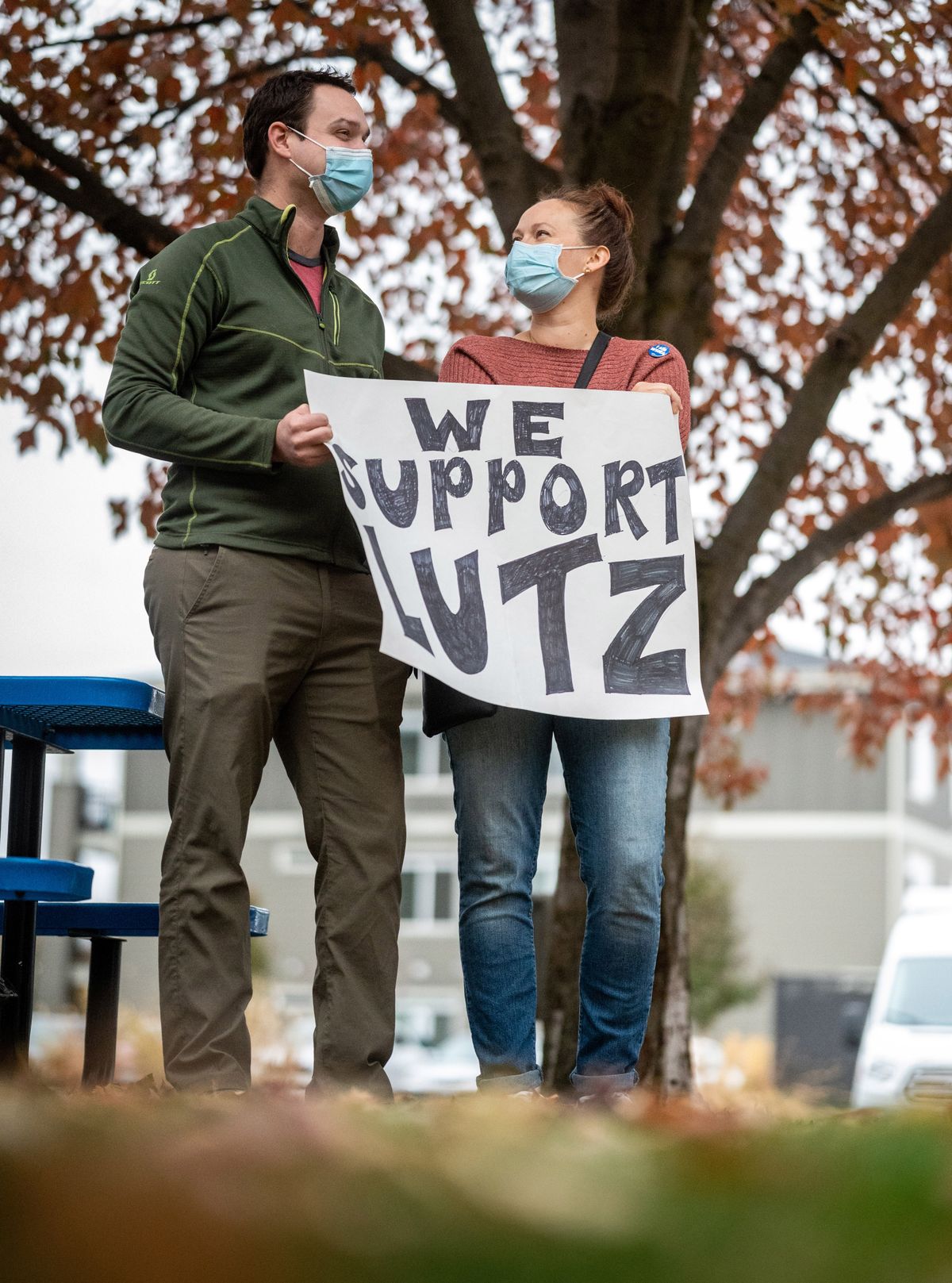Health Board fires Dr. Bob Lutz
Before the Spokane Regional Health District Board of Health met virtually, Josh Hubbard, a physician and Chelsea Rasmussen a registered nurse attend a small rally Thursday in support of Health Officer Dr. Bob Lutz outside the Public Health Building. (Colin Mulvany/THE SPOKESMAN-REVIEW)
The Spokane County Health Board fired health officer Dr. Bob Lutz following a four-hour special meeting on Thursday.
In an 8-4 vote, the board ended his employment. The three Spokane City Council board members and appointed member Jason Kinley voted in favor of keeping Lutz.
Commissioner Al French then made a motion to make Dr. Francisco Velazquez the interim health officer, after internal candidates identified by the health district earlier this week backed out. Some board members seemed surprised at the nomination, but he was confirmed as the interim health officer until the next board meeting.
Administrator Amelia Clark said it was important that the district has the coverage of a physician even until the next board meeting in December. Some board members warned that recruiting a health officer is going to be difficult, especially in the midst of COVID-19.
“This is going to take a significant amount of time in the midst of a pandemic,” Millwood Mayor Kevin Freeman said.
Lutz released a statement through his attorney following the meeting indicating that he still believes he was wrongfully fired.
“Despite statements made by some members of the Board, Dr. Lutz believes his termination was without reasonable cause and was politically motivated in retaliation for unpopular Covid-19 decisions he made this year,” the statement from attorney Bryce Wilcox says. “He will pursue all claims and remedies available to him under the law for SRHD’s wrongful termination.”
Though the City of Spokane’s representatives on the health board voted to retain Lutz, Spokane Mayor Nadine Woodward supported the firing, calling it the “best news I’ve heard in a long time,” in a letter she submitted to board members as part of public comment ahead of today’s vote.
She described herself as “frustrated” as Spokane County has been stuck in Phase 2 of the economic reopening plan to the detriment of people and businesses.
“Important community decisions are being made by a single entity,” she said of Lutz. “Information sharing with partners has slowed to a trickle. Public communication has come from one source.
“That, as the data has been telling us for months now, does not work.”
Health board members said during the meeting that economic considerations were not part of their decision to fire Lutz. Instead, they turned to the allegations leveled by Clark.
Clark wanted Lutz fired for insubordination and a pattern of making decisions about the direction of the agency behind her back, among other reasons.
Last Thursday, she forced out Lutz in an apparent surprise to some board members. Clark offered Lutz a severance package while also seizing his agency keys, laptop, cellphone and ID badge, effectively locking him out, according to a statement from Lutz released Monday.
Clark did not have the authority to terminate Lutz on her own, however, setting up Thursday’s emergency meeting.
Clark presented a broad case to have him fired, including multiple allegations of insubordination, inappropriate spending and sexist behavior with female employees. Clark also said Lutz didn’t go to the board for consent before addressing “controversial” topics like climate change. She later said she shouldn’t have used the word “controversial,” and that any statements around policy should be cleared by her.
In the immediate aftermath of the meeting, more than 120 health district employees cast a vote of no confidence against Clark. They are members of the union representing staff.
Several board members sought compromise and asked Clark and Lutz whether they could try again to work out their personal and professional differences.
“I don’t know that Dr. Lutz and I could come back from this, at this point,” Clark responded.
Wilcox said he had less than 48 hours to respond to a six-page letter from Clark that laid out the “summary of misconduct” brought against Lutz. Throughout the meeting, Lutz attempted to respond to Clark’s allegations, and he provided more complete written responses to board members before the meeting.
Clark detailed numerous instances in which she said Lutz would go behind her back to do something she explicitly did not approve, or not keep her in the loop of his actions. Examples she gave included COVID-19 decisions, like trying to get a field hospital for inmates earlier this year, to the content and byline on opinion articles published by The Spokesman-Review.
Clark said Lutz had bought a $200 Wi-Fi hotspot for his cabin where he has worked remotely at various points in the pandemic. She said he also bought meals for staff working at the health district and sought reimbursement. Lutz admitted to these expenses, noting that she approved the hotspot expense and that, when it was brought to his attention that district funds couldn’t be used to buy food for employees, he kept purchasing meals for them with his own funds.
Clark also alleged that Lutz has used his position as the health officer in inappropriate ways. She said Lutz participated in one of the largest demonstrations in Spokane against police brutality against Black Americans, an event that violated the governor’s gathering guidance at the time.
After the May 31 protest that brought thousands people downtown, Lutz told a reporter: “We have a society that has institutionalized racism and to speak to that is part of what we do in public health.”
Clark also told the board that Lutz had planned to send a letter on health district letterhead to Eastern Washington University decrying cuts to the school’s public health department. And she said he emailed state lawmakers Sen. Andy Billig and Rep. Marcus Riccelli regarding firearm controls.
Lutz said he had sent the lawmakers the link to an article about preventing child access to firearms, which he said relates to health district programs and policies concerning suicide and domestic violence.
Under state law, the health officer’s power to promote public health is expansive and includes the ability to “take such measures as he or she deems necessary in order to promote the public health, to participate in the establishment of health educational or training activities.”
Lutz’s reputation within the district was also up for discussion. Clark revealed past investigations into his conduct with female employees, including what some women in the district reported as sexist behavior and one incident where he allegedly touched an employee on the shoulder.
“I can’t say that I have done that,” Lutz said of the alleged sexist behavior, noting he believes other colleagues would agree.
Lutz said he was accused at the time of touching an employee’s shoulder during a discussion, but said he had not.
“I placed my hand on her arm as I was asking her a question about obtaining clothing for homeless individuals,” he told board members on Thursday.
Lutz acknowledged his behavior could be better on occasion but denied any of the complaints were worthy of termination and said they either warranted context or were mischaracterized altogether.
Spokane City Councilmember Betsy Wilkerson said she didn’t notice a pattern of behavior that warranted termination, but other board members appeared to side with Clark and questioned Lutz about his positions and behavior.
When asked by a board member whether they respected each other, Lutz and Clark couldn’t bring themselves to say yes.
“I feel that the trust bridge between Dr. Lutz and I has been burned,” Clark responded, while Lutz said, “It’s difficult to respect someone who doesn’t have respect.”
Ultimately, the relationship between Lutz and Clark appeared irreparable. Although Lutz said he would be open to third-party facilitation, Clark said she would have to think about it.
“I feel that the pattern of behavior that is most critical is that when I speak with Dr. Lutz and have conversations, I think we’re in agreement, and he leaves the room and we are not on the same page,” Clark told the board. “It is very concerning to me that he goes around to discuss his grievances and displeasures regarding me without coming to me.”
One instance of Lutz reaching out to a community member concerning Clark surfaced during questioning. Lutz sent an email to Mary Selecky, the long-time former state health secretary, noting that Clark was “in over her head” in the midst of a pandemic.
Clark never initiated a corrective action plan with Lutz, despite a meeting in June between her, Lutz, Board of Health Chair Ben Wick and vice chair Mary Kuney. Lutz said there was no formal plan to help the two work on their communication beyond continuing one-on-one weekly meetings. Kuney said at the time she felt that Clark and Lutz could work it out without a third-party facilitator.
“I felt strongly that I needed the two of you to work together, and we shouldn’t need a facilitator for our top two employees,” Kuney said.
Instead, their relationship deteriorated. Clark never gave Lutz a formal corrective action plan after the June meeting.
Last week, she provided Lutz with a document outlining a severance agreement and told him she would be going forward requesting his firing.
“He was no longer acting as the health officer after your meeting with him on Thursday? Is that fair to say?” Spokane City Council President Breean Beggs asked Clark.
“Yes, I would say that,” she answered.
Ousting Lutz in the midst of a pandemic, with cases surging in the Inland Northwest, has drawn ire from current and former health district employees and the broader Spokane medical community.
Lutz has been the face of the community’s pandemic response, often making unpopular decisions ranging from enforcing bans on large gatherings, to advising schools to move to distance learning, to recommending the shuttering of major pieces of the economy.
Such tough decision-making sometime became personal. This summer, protesters showed up at Lutz’s home.
Board members noted that they appreciated the work and perseverance of Lutz, but regretted that he had become a problematic employee who needed to be fired for the good of health district operations.
Separately from the local board of health meeting, a group of Spokane ethicists and former City Council President Ben Stuckart has filed complaints with the Washington State Board of Health. Lutz is a board member on the state board of health.
Both complaints are against Clark, while one also calls out the health board. Both complaints assert Clark broke state law as well as the board’s own bylaws by firing Lutz before the board approved it. These two complaints are on the docket for the state health board’s meeting on Monday.
The state health board will review the complaints and decide whether to conduct a preliminary investigation.
Staff writer Rebecca White contributed to this story


